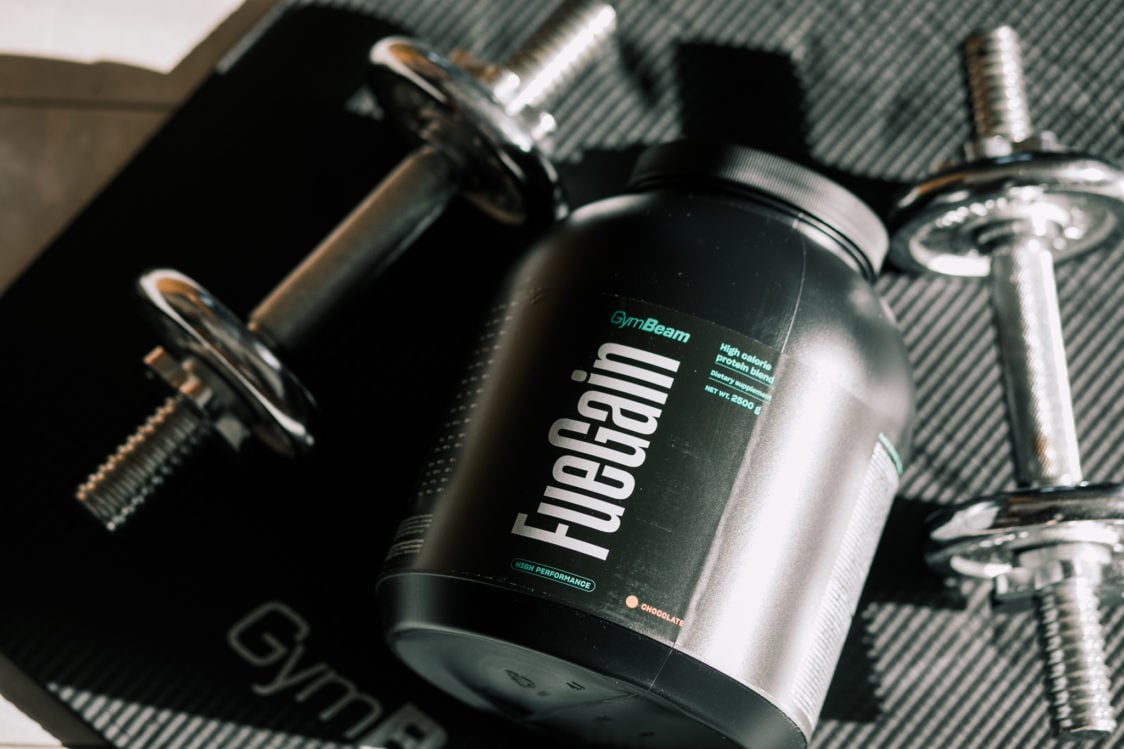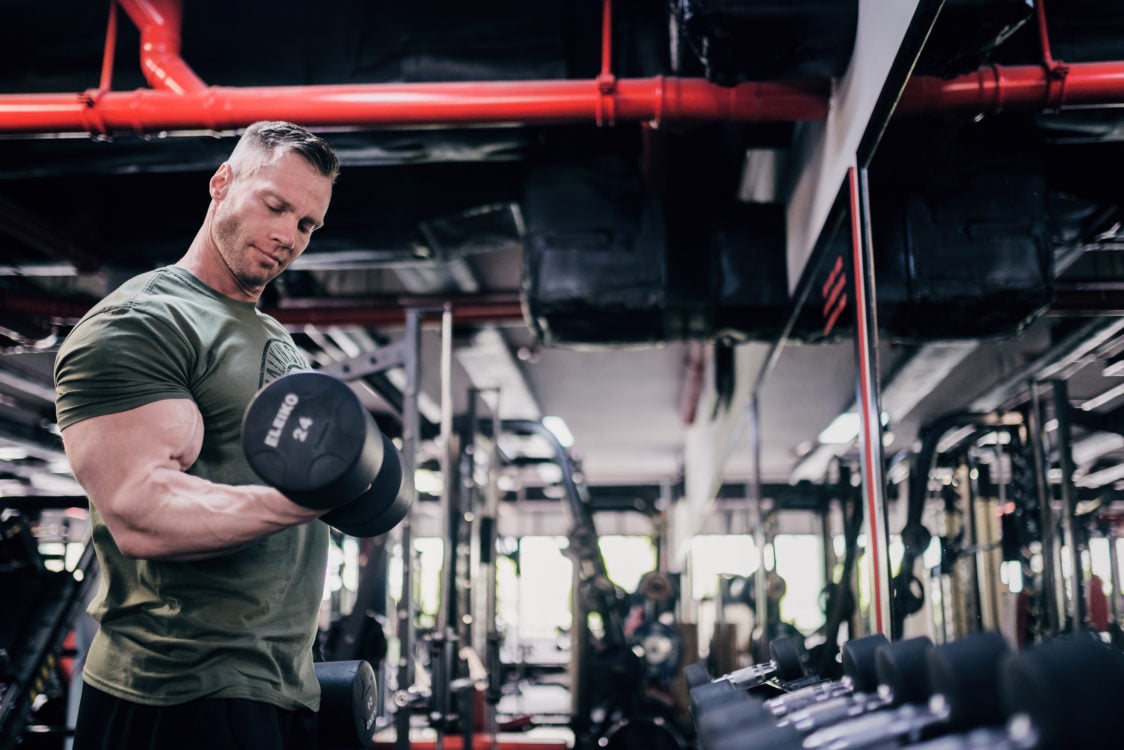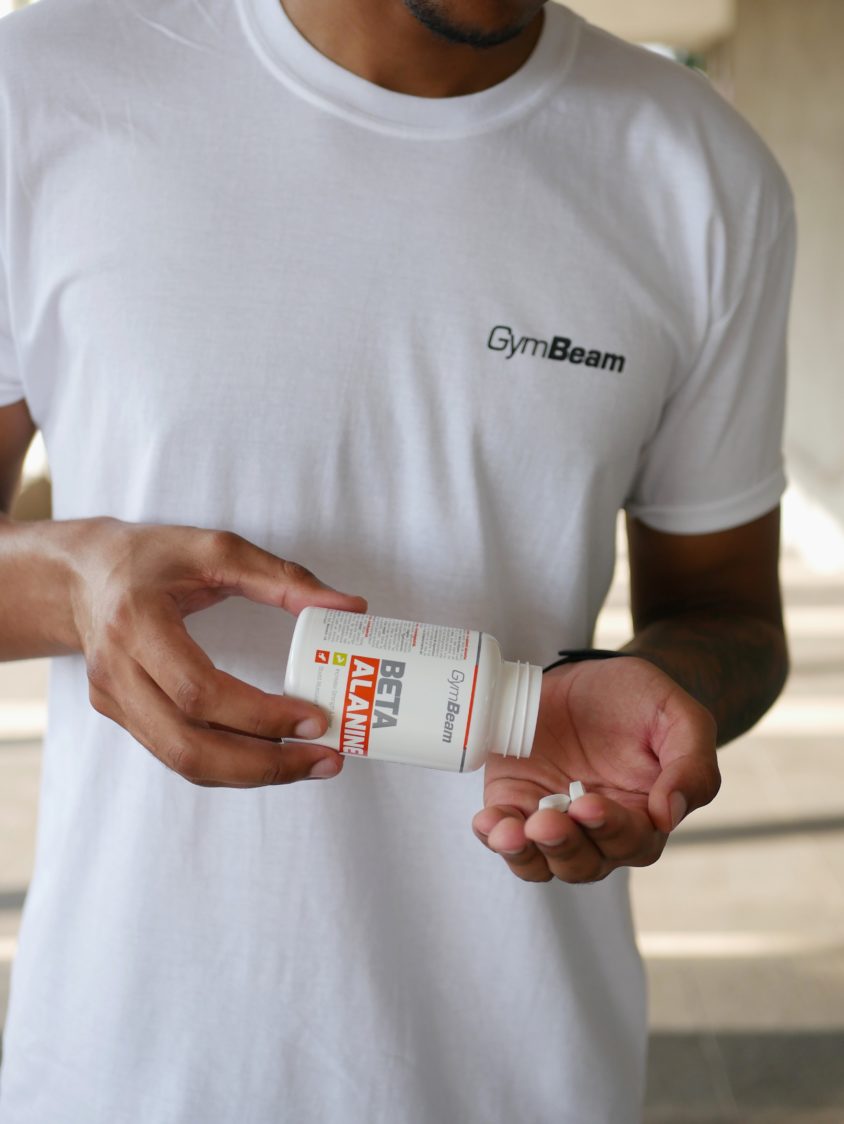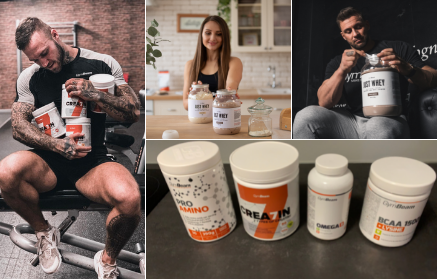Table of Contents
Consistent exercise, balanced diet and regeneration. These are the three main pillars of every athlete. However, sometimes your diet and eating plan might not be perfect. Even if you try, there will always be days when you have to prioritize responsibilities and push your balanced diet aside. In this case, some dietary supplements can save you by giving your body exactly what it needs.
At the same time, these supplements can greatly support your training efforts, especially if they go hand in hand with a healthy diet. This way, you can increase your protein or energy intake, contribute to faster regeneration and improve performance. However, the offer of nutritional supplements is really wide, so it is not easy to find your way around them. In this article, we will advise you on which nutritional supplements are a must if you are striving for the best results.
An overview of basic supplements that should not be missing in your stash
1. Protein powder
Protein powder is one of the most practical and sought after supplements. This is because if you want to gain muscle, you need to consume more protein than your body can break down by natural processes. And that’s what protein powder can help you with. [1]
Whey protein is considered to be the leader in this regard. It contains all the essential amino acids and is also very digestible compared to other sources. It quickly delivers a decent portion of the protein needed to grow and maintain muscle mass to your body.

Various studies also support the use of protein powder. The results show that extra protein obtained from dietary supplements can have an effect on higher muscle gain and strength gain. It will help you with protein intake and meet your recommended daily intake. To support muscle growth, the serving size should be in the range of 1.4–2 g of protein per kilogram of body weight. In addition, protein will contribute to faster muscle regeneration after exercise. Quality protein supplement can offer 20 -30 g of protein in one serving and you can take it at any time of the day. [2–3] [37]
Reasons to supplement protein
We have summarised the main benefits of protein powder in the following points [4–6]:
- supports the growth of muscle mass and strength
- contributes to accelerating regeneration
- a simple and quick way to replenish missing proteins
- can contribute to weight loss
- can have a positive effect on blood pressure and cholesterol levels
If you are interested in the topic of protein, be sure to read our article How to Choose the Right Protein Powder for Weight Loss or Muscle Growth.
2. Gainer
In addition to protein, gainer is one of the most popular supplements as well. It is usually sought after by people who want to gain muscle. However, its great benefit is that it allows you to increase caloric intake and thus cover the energy requirements of intensive training. The main difference between a protein and a gainer is the fact that the gainer is a blend rich not only in protein but mainly in carbohydrates. And carbohydrates that are the primary source of energy in gainers. However, the times when gainers were considered a fast and cheap source of energy are long gone. The high-quality ones contain a wide range of micro and macronutrients in a balanced ratio. [7]

The best time to use a quality gainer is before or after exercise, or at any time during the day to replenish energy or increase caloric intake. In terms of quantity, you need to take into consideration the serving recommended on the packaging, which should be in line with your energy and nutrient requirements. Active women do not have to worry about taking this supplement either. They can use gainers without fear that their body will get muscular male shape. This is physiologically impossible. [8–9]
Reasons to use a gainer
We have summarised the main benefits of the gainer in the following points [10–11]:
- offers extra calories from quality sources
- contains a large amount of carbohydrates and protein
- a great source of energy
- helps build muscle mass
- an easy way to supplement calories
- very convenient to use at any time of the day
- often contains additional ingredients in the form of vitamins, minerals or fibre
- A complex gainer can also replace 1-2 full meals
Find out more on the topic of gainers in the article How to Choose the Best Gainer for Muscle Growth?
You might be interested in these products:
3. BCAA
BCAA, or branched chain amino acids consist of three separate amino acids, namely valine, leucine, and isoleucine. You can find BCAA in most protein sources, especially of animal origin, such as meat, eggs, fish, poultry, or dairy products. And why should you pay attention to amino acids?
BCAAs are part of the essential amino acids that are very important for muscle growth. Another significant fact is that BCAA make up about 14-18% of the total amino acids in muscles. Leucine, which is one of them, has anabolic effects, thanks to which it stimulates muscle protein synthesis (MPS) the most of all amino acids. BCAA can also be used as a source of energy during demanding training, thus protecting muscle mass. In addition, due to its effect on serotonin, BCAA can reduce the feeling of fatigue.

The recommended serving of BCAA is in the range of 5–10 grams before, during or after training, as part of protein supplementation. However, you can also this nutritional supplement at any time during the day in the form of a refreshing drink. [12–14]
Reasons to supplement BCAAs
We have summarised the main benefits of BCAAs in the following points [14–18]:
- can increase protein synthesis and thus promote muscle growth
- contribute to reducing fatigue during strenuous exercise
- can improve endurance performance
- protect muscles from breakdown for energy
You can learn more about this supplement in the article BCAAs and Their Effects on the Body.
4. Creatine
Creatine is one of the most popular substances in the fitness world. Nevertheless, not everyone understands its effects. Consequently, you can often come across exaggerated expectations or various myths about creatine. The fact is that it is a molecule that is naturally formed in our body, especially in the liver. In addition, you can find it in various food sources, particularly in meat and fish. [19]
Increased creatine stores in the body also increase the rate of availability of the basic form of energy, which is ATP. This is essential in high-intensity training and other high-intensity activities. Moreover, your workout session can sometimes require higher ATP consumption per second than your body can produce on its own. The result of this phenomenon is, for example, that you can sprint full-speed for only a few seconds. Creatine supplementation can help increase its level in the body. As a result, you will be able to deliver more intense performance over a longer period of time.

The best way to increase the creatine supply in the muscles is to use it long-term without a break, in the amount of 3-5 g per day. Vegans who do not consume food from animal sources, which are naturally rich in creatine, can also benefit from its advantages. [21–22]
Reasons to supplement creatine
We have summarised the main benefits of creatine in the following points [23–27]:
- it can improve brain function
- supports high-intensity exercise
- contributes to muscle building
- supports greater energy production of muscle cells
If you are further interested in the topic of creatine, be sure not to miss the article How to Choose the Best Creatine Supplement. It offers various tips, disproves myths and comprehensively summarizes all the benefits and effects of this substance.
5. HMB
β-Hydroxy-β-methylbutyric acid or simply – HMB is a molecule that is formed during the decomposition/processing of leucine in our body. HMB affects muscle protein synthesis and can contribute to faster regeneration after insensitive training. In addition, it can be very useful for reducing the breakdown of muscle protein. Under certain conditions, it can even prevent it from happening at all. [28]
The effect of HMB on muscle building has also been looked at in various studies. The findings showed that taking 1.5-6 grams of HMB every day can improve muscle gain during strength training. However, its effectiveness is higher for beginners and untrained athletes. This means that if you have been training for a long time, HMB supplementation may not be as effective as for beginners. [29–30]
Reasons to supplement HMB
We have summarised the main benefits of HMB in the following points [29–34]:
- can contribute to muscle growth
- can play an important role in reducing the breakdown of muscle protein and, under certain conditions, it can prevent it
- can streamline adaptation to training and support performance
- can improve regeneration

Other alternatives to support sports performance
To fully support your efforts during training, you can easily expand the basic range of supplements with additional ones. For example, beta-alanine, which is a sought-after supplement in the world of fitness, can benefit muscle endurance, especially during intense exercise.
This is one of the reasons why beta-alanine is a popular ingredient in various pre-workout boosters. You should take it in the amount of 4-6 grams per day, in one or more servings. After a month of use, you can reduce the serving and switch to 2-5 grams per day. Larger servings of beta-alanine can cause tingling, called paraesthesia. This is a harmless phenomenon that can be eliminated by taking smaller and gradual servings in the range of 0.8-1 g several times a day. [35, 38]
Another effective supplement is citrulline malate. It is a compound of the L-citrulline amino acid in combination with malic acid (malate). L-citrulline can increase the levels of arginine and ornithine, and consequently the synthesis of nitric oxide. As a result, it can contribute to faster muscle perfusion, increased strength and endurance. The recommended serving of citrulline malate to improve athletic performance is in the range of 6,000-8,000 mg about an hour before exercise. [36]
Summary
Taking dietary supplements is one of the most popular and effective ways to maximize your training efforts. However, a healthy and balanced diet full of nutrients remains the highest priority. If you get to know the benefits of basic dietary supplements, together with a proper use and a balanced diet, you can get the most out of your nutrition and exercise. Individual supplements have been the subject of dozens to hundreds of studies that have confirmed their importance, so there is no need to worry about using them.
[1] Stuart M Phillips, Joseph W Hartman, Sarah B Wilkinson - Dietary protein to support anabolism with resistance exercise in young men – https://pubmed.ncbi.nlm.nih.gov/15798080/
[2] Chad M Kerksick, Christopher J Rasmussen, Stacy L Lancaster, Bharat Magu, Penney Smith - The effects of protein and amino acid supplementation on performance and training adaptations during ten weeks of resistance training – https://pubmed.ncbi.nlm.nih.gov/16937979/
[3] Y Boirie, M Dangin, P Gachon, M P Vasson, J L Maubois, B Beaufrère - Slow and fast dietary proteins differently modulate postprandial protein accretion – https://pubmed.ncbi.nlm.nih.gov/9405716/
[4] Stefan M Pasiakos, Tom M McLellan, Harris R Lieberman - The effects of protein supplements on muscle mass, strength, and aerobic and anaerobic power in healthy adults: a systematic review – https://pubmed.ncbi.nlm.nih.gov/25169440/
[5] Jooyoung Kim, Chulhyun Lee, Joohyung Lee - Effect of timing of whey protein supplement on muscle damage markers after eccentric exercise – https://www.ncbi.nlm.nih.gov/pmc/articles/PMC5667622/
[6] Kamonkiat Wirunsawanya, Sikarin Upala, Veeravich Jaruvongvanich, Anawin Sanguankeo - Whey Protein Supplementation Improves Body Composition and Cardiovascular Risk Factors in Overweight and Obese Patients: A Systematic Review and Meta-Analysis – https://www.tandfonline.com/doi/abs/10.1080/07315724.2017.1344591
[7] Ramiz Shah - Mass gainer vs. whey protein – Know what it is better for you – https://squatwolf.com/blog/mass-gainer-vs-whey-protein/
[8] Rohan Arora- How to Use Mass Gainer and Build Muscle – https://www.gainingtactics.com/how-to-use-mass-gainer-and-build-muscle/
[9] Are Mass Gainers for Women a Good Idea? – https://olimpsport.com/eu/are-mass-gainers-for-women-a-good-idea
[10] How to Choose the Right Mass Gainer – https://www.muscleblaze.com/articles/Supplements/how-to-choose-the-right-mass-gainer/4269
[11] Louisa Richards - 5 of the best mass gainers for building muscle mass – https://www.medicalnewstoday.com/articles/best-mass-gainer
[12] Eva Blomstrand, Jörgen Eliasson, Håkan K R Karlsson, Rickard Köhnke - Branched-chain amino acids activate key enzymes in protein synthesis after physical exercise – https://pubmed.ncbi.nlm.nih.gov/16365096/
[13] Best BCAA for Women – https://jamieisrunning.com/best-bcaa-for-women/#easy-footnote-1-346
[14] BCAA Benefits and reasons you should take them today – https://guenergy.com/blogs/blog/6-reasons-why-you-should-take-bcaas-today
[15] E. BLOMSTRAND, P. HASSMÉN, S. EK, B. EKBLOM, E. A. NEWSHOLME - Influence of ingesting a solution of branched-chain amino acids on perceived exertion during exercise – https://onlinelibrary.wiley.com/doi/abs/10.1046/j.1365-201X.1997.547327000.x
[16] Wesley C Kephart, Taylor D Wachs, R Mac Thompson, C Brooks Mobley, Carlton D Fox - Ten weeks of branched-chain amino acid supplementation improves select performance and immunological variables in trained cyclists – https://pubmed.ncbi.nlm.nih.gov/26553453/
[17] Keitaro Matsumoto, Takashige Koba, Koichiro Hamada, Hisaya Tsujimoto, Ryoichi Mitsuzono - Branched-chain amino acid supplementation increases the lactate threshold during an incremental exercise test in trained individuals – https://pubmed.ncbi.nlm.nih.gov/19352063/
[18] Shihai Zhang, Xiangfang Zeng, Man Ren, Xiangbing Mao & Shiyan Qiao - Novel metabolic and physiological functions of branched chain amino acids: a review – https://jasbsci.biomedcentral.com/articles/10.1186/s40104-016-0139-z
[19] Creatine – https://examine.com/supplements/creatine/
[20] M H Williams, J D Branch - Creatine supplementation and exercise performance: an update – https://pubmed.ncbi.nlm.nih.gov/9627907/
[21] A Casey, P L Greenhaff - Does dietary creatine supplementation play a role in skeletal muscle metabolism and performance? – https://pubmed.ncbi.nlm.nih.gov/10919967/
[22] Thomas W Buford, Richard B Kreider, Jeffrey R Stout, Mike Greenwood, Bill Campbell, Marie Spano - International Society of Sports Nutrition position stand: creatine supplementation and exercise – https://www.ncbi.nlm.nih.gov/pmc/articles/PMC2048496/
[23] Joseph Nordqvist - Should I use creatine supplements? – https://www.medicalnewstoday.com/articles/263269
[24] P D Balsom, K Söderlund, B Sjödin, B Ekblom - Skeletal muscle metabolism during short duration high-intensity exercise: influence of creatine supplementation – https://pubmed.ncbi.nlm.nih.gov/7572228/
[25] M Francaux, J R Poortmans - Effects of training and creatine supplement on muscle strength and body mass – https://pubmed.ncbi.nlm.nih.gov/10408330/
[26] Caroline Rae, Alison L Digney, Sally R McEwan,Timothy C Bates - Oral creatine monohydrate supplementation improves brain performance: a double-blind, placebo-controlled, cross-over trial – https://www.ncbi.nlm.nih.gov/pmc/articles/PMC1691485/
[27] Amanda V. Bakian, Rebekah S. Huber, Lindsay Scholl, Perry F. Renshaw & Douglas Kondo - Dietary creatine intake and depression risk among U.S. adults – https://www.nature.com/articles/s41398-020-0741-x
[28] Jacob M Wilson, Peter J Fitschen, Bill Campbell, Gabriel J Wilson, Nelo Zanchi, Lem Taylor - International Society of Sports Nutrition Position Stand: beta-hydroxy-beta-methylbutyrate (HMB) – https://jissn.biomedcentral.com/articles/10.1186/1550-2783-10-6
[29] S Nissen, R Sharp, M Ray, J A Rathmacher, D Rice, J C Fuller Jr, A S Connelly, N Abumrad - Effect of leucine metabolite beta-hydroxy-beta-methylbutyrate on muscle metabolism during resistance-exercise training – https://pubmed.ncbi.nlm.nih.gov/8941534/
[30] L B Panton, J A Rathmacher, S Baier, S Nissen - Nutritional supplementation of the leucine metabolite beta-hydroxy-beta-methylbutyrate (hmb) during resistance training – https://pubmed.ncbi.nlm.nih.gov/10978853/
[31] Hongmei Wu, Yang Xia, Jin Jiang, Huanmin Du, Xiaoyan Guo, Xing Liu, Chunlei Li, Guowei Huang, Kaijun Niu - Effect of beta-hydroxy-beta-methylbutyrate supplementation on muscle loss in older adults: a systematic review and meta-analysis – https://pubmed.ncbi.nlm.nih.gov/26169182/
[32] Milan Holeček - Beta-hydroxy-beta-methylbutyrate supplementation and skeletal muscle in healthy and muscle-wasting conditions – https://pubmed.ncbi.nlm.nih.gov/28493406/
[33] Krzysztof Durkalec-Michalski, Jan Jeszka - The efficacy of a β-hydroxy-β-methylbutyrate supplementation on physical capacity, body composition and biochemical markers in elite rowers: a randomised, double-blind, placebo-controlled crossover study – https://pubmed.ncbi.nlm.nih.gov/26225130/
[34] Ryan Raman - Hydroxymethylbutyrate (HMB): Benefits, Downsides, and More – https://www.healthline.com/nutrition/hmb#benefits
[35] Beta-Alanine – https://examine.com/supplements/beta-alanine/
[36] Citrulline – https://examine.com/supplements/citrulline/
[37] Ralf Jäger, Chad M. Kerksick, Bill I. Campbell, Paul J. Cribb, Shawn D. Wells, Tim M. Skwiat - International Society of Sports Nutrition Position Stand: protein and exercise – https://jissn.biomedcentral.com/articles/10.1186/s12970-017-0177-8
[38] Eric T. Trexler, Abbie E. Smith-Ryan, Jeffrey R. Stout, Jay R. Hoffman, Colin D. Wilborn, Craig Sale - International society of sports nutrition position stand: Beta-Alanine – https://jissn.biomedcentral.com/articles/10.1186/s12970-015-0090-y


Add a comment